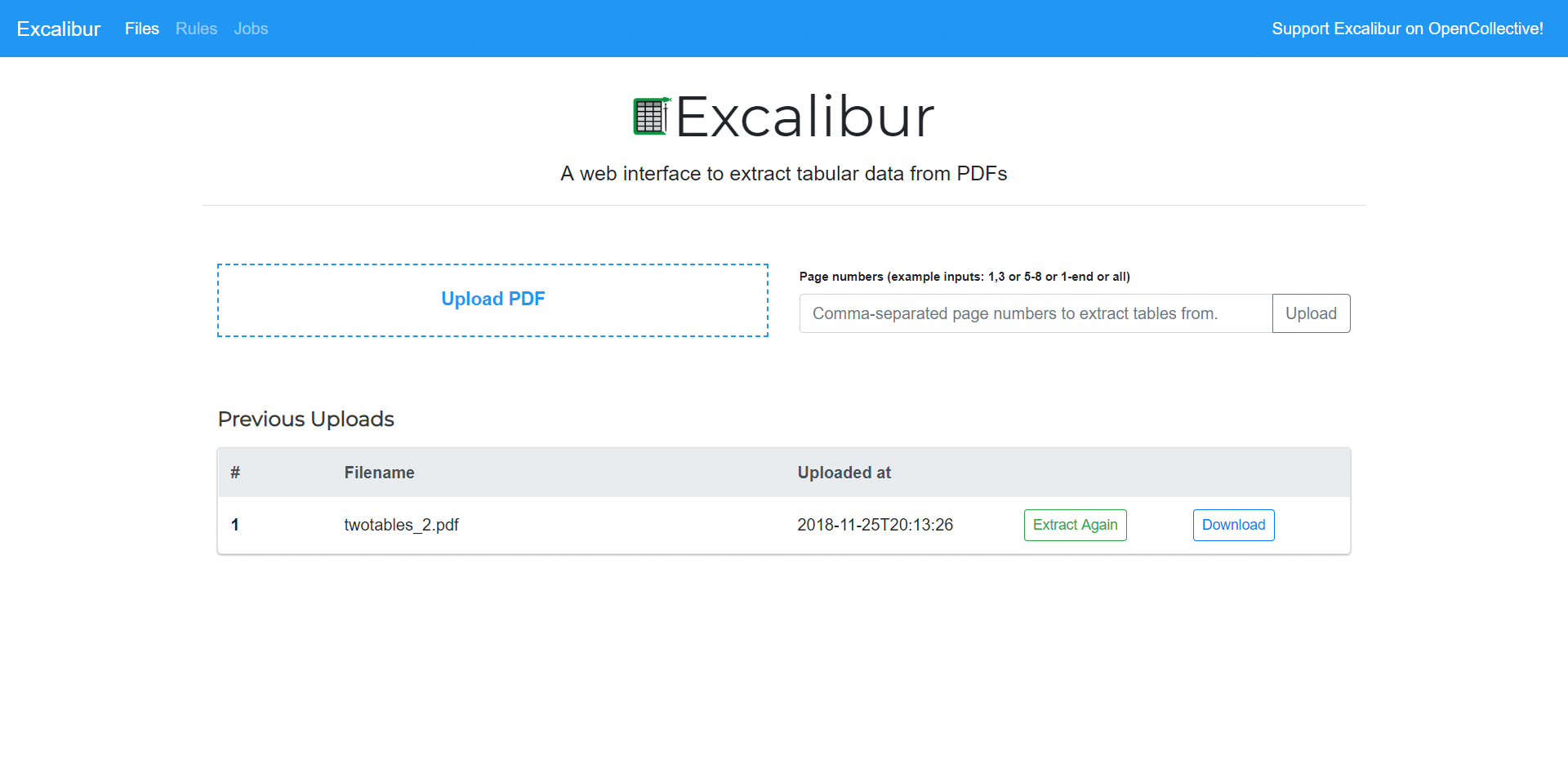https://github.com/camelot-dev/excalibur
A web interface to extract tabular data from PDFs
https://github.com/camelot-dev/excalibur
extract for-humans pdf table
Last synced: 11 months ago
JSON representation
A web interface to extract tabular data from PDFs
- Host: GitHub
- URL: https://github.com/camelot-dev/excalibur
- Owner: camelot-dev
- License: mit
- Created: 2018-10-20T11:34:49.000Z (over 7 years ago)
- Default Branch: master
- Last Pushed: 2023-07-15T11:04:03.000Z (over 2 years ago)
- Last Synced: 2024-04-14T01:00:38.601Z (almost 2 years ago)
- Topics: extract, for-humans, pdf, table
- Language: HTML
- Homepage: https://excalibur-py.readthedocs.io
- Size: 17.8 MB
- Stars: 1,457
- Watchers: 38
- Forks: 219
- Open Issues: 106
-
Metadata Files:
- Readme: README.md
- Changelog: HISTORY.md
- Contributing: CONTRIBUTING.md
- Funding: .github/FUNDING.yml
- License: LICENSE
- Code of conduct: CODE_OF_CONDUCT.md
Awesome Lists containing this project
- awesome-python-applications - Repo
- awesome-python-applications - Repo
- best-of-python - GitHub - 74% open · ⏱️ 03.01.2025): (Data Loading & Extraction)
README

# Excalibur: A web interface to extract tabular data from PDFs
[](https://excalibur-py.readthedocs.io/en/master/) [](https://pypi.org/project/excalibur-py/) [](https://pypi.org/project/excalibur-py/) [](https://pypi.org/project/excalibur-py/) [](https://gitter.im/camelot-dev/Lobby) [](https://github.com/ambv/black) [](https://deepsource.io/gh/camelot-dev/excalibur/?ref=repository-badge)
**Excalibur** is a web interface to extract tabular data from PDFs, written in **Python 3**! It is powered by [Camelot](https://camelot-py.readthedocs.io/).
**Note:** Excalibur only works with text-based PDFs and not scanned documents. (As Tabula [explains](https://github.com/tabulapdf/tabula#why-tabula), "If you can click and drag to select text in your table in a PDF viewer, then your PDF is text-based".)
## Using Excalibur
**Note:** You need to [install ghostscript](https://camelot-py.readthedocs.io/en/master/user/install-deps.html) before moving forward.
After [installing Excalibur with pip](https://excalibur-py.readthedocs.io/en/master/user/install.html), you need to initialize the metadata database using:
$ excalibur initdb
And then start the webserver using:
$ excalibur webserver
That's it! Now you can go to http://localhost:5000 and start extracting tabular data from your PDFs.
1. **Upload** a PDF and enter the page numbers you want to extract tables from.
2. Go to each page and select the table by drawing a box around it. (You can choose to skip this step since Excalibur can automatically detect tables on its own. Click on "**Autodetect tables**" to see what Excalibur sees.)
3. Choose a flavor (Lattice or Stream) from "**Advanced**".
a. **Lattice**: For tables formed with lines.
b. **Stream**: For tables formed with whitespaces.
4. Click on "**View and download data**" to see the extracted tables.
5. Select your favorite format (CSV/Excel/JSON/HTML) and click on "**Download**"!
**Note:** You can also download executables for Windows and Linux from the [releases page](https://github.com/camelot-dev/excalibur/releases) and run them directly!

## Why Excalibur?
- Extracting tables from PDFs is hard. A simple copy-and-paste from a PDF into an Excel doesn't preserve table structure. **Excalibur makes PDF table extraction very easy**, by automatically detecting tables in PDFs and letting you save them into CSVs and Excel files.
- Excalibur uses [Camelot](https://camelot-py.readthedocs.io/) under the hood, which gives you additional settings to tweak table extraction and get the best results. You can see how it performs better than other open-source tools and libraries [in this comparison](https://github.com/socialcopsdev/camelot/wiki/Comparison-with-other-PDF-Table-Extraction-libraries-and-tools).
- You can save table extraction [settings](https://excalibur-py.readthedocs.io/en/master/user/faq.html#faq) (like table areas) for a PDF once, and apply them on new PDFs to extract tables with similar structures.
- You get complete control over your data. All file storage and processing happens on your own local or remote machine.
- Excalibur can be configured with MySQL and Celery for parallel and distributed workloads. By default, sqlite and multiprocessing are used for sequential workloads.
## Installation
### Using pip
After installing [ghostscript](https://www.ghostscript.com/), which is one of the requirements for Camelot (See [install instructions](https://camelot-py.readthedocs.io/en/master/user/install-deps.html)), you can simply use pip to install Excalibur:
$ pip install excalibur-py
### From the source code
After installing ghostscript, clone the repo using:
$ git clone https://www.github.com/camelot-dev/excalibur
and install Excalibur using pip:
$ cd excalibur
$ pip install .
## Documentation
Fantastic documentation is available at [http://excalibur-py.readthedocs.io/](http://excalibur-py.readthedocs.io/).
## Development
The [Contributor's Guide](https://excalibur-py.readthedocs.io/en/master/dev/contributing.html) has detailed information about contributing code, documentation, tests and more. We've included some basic information in this README.
### Source code
You can check the latest sources with:
$ git clone https://www.github.com/camelot-dev/excalibur
### Setting up a development environment
You can install the development dependencies easily, using pip:
$ pip install excalibur-py[dev]
### Testing (soon)
After installation, you can run tests using:
$ python setup.py test
## Versioning
Excalibur uses [Semantic Versioning](https://semver.org/). For the available versions, see the tags on this repository. For the changelog, you can check out [HISTORY.md](https://github.com/camelot-dev/excalibur/blob/master/HISTORY.md).
## License
This project is licensed under the MIT License, see the [LICENSE](https://github.com/camelot-dev/excalibur/blob/master/LICENSE) file for details.
## Support the development
You can support our work on Excalibur with a one-time or monthly donation [on OpenCollective](https://opencollective.com/excalibur). Organizations who use Excalibur can also sponsor the project for an acknowledgement on [our official site](https://www.tryexcalibur.com/) and this README.
Special thanks to all the users and organizations that support Excalibur!